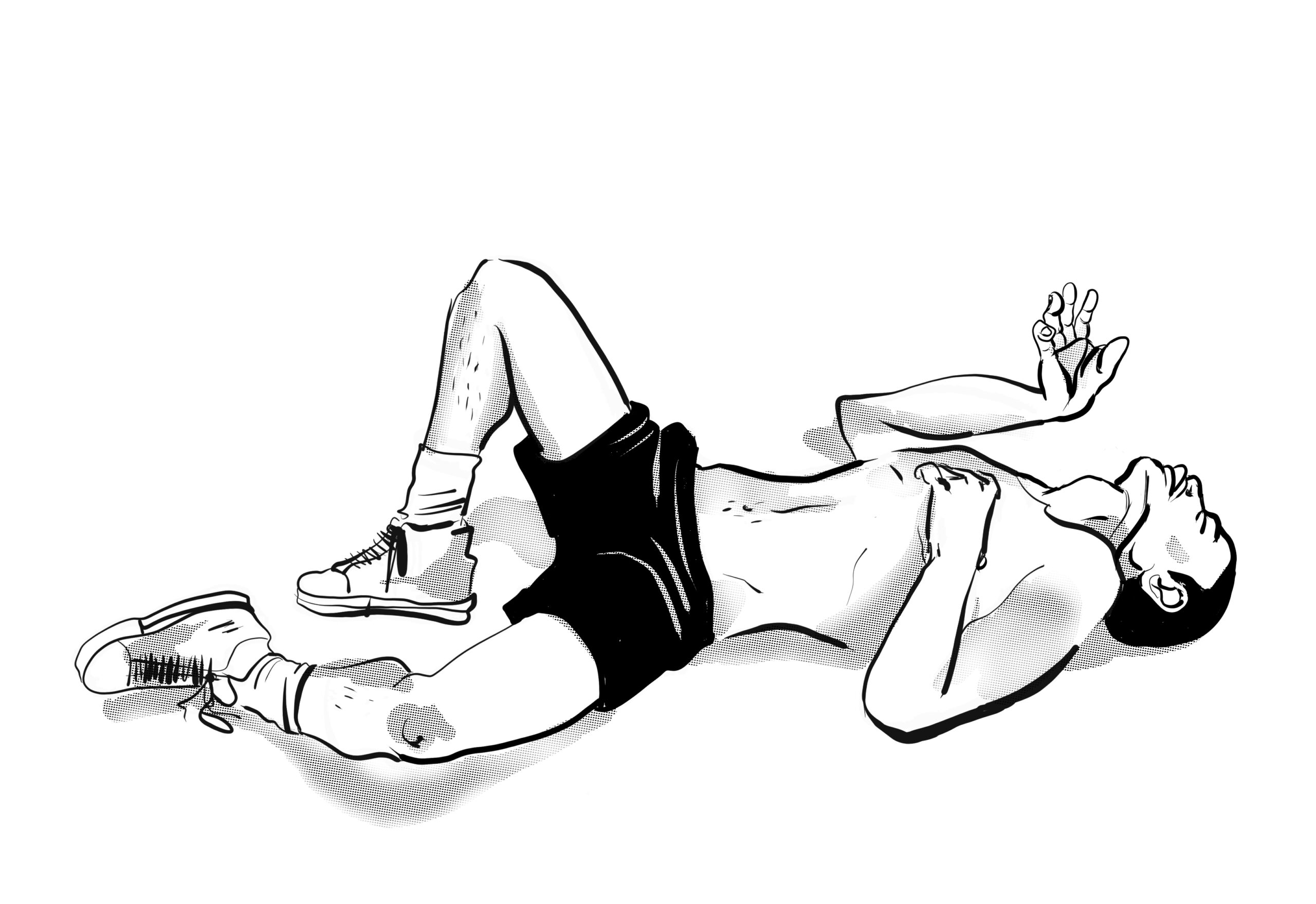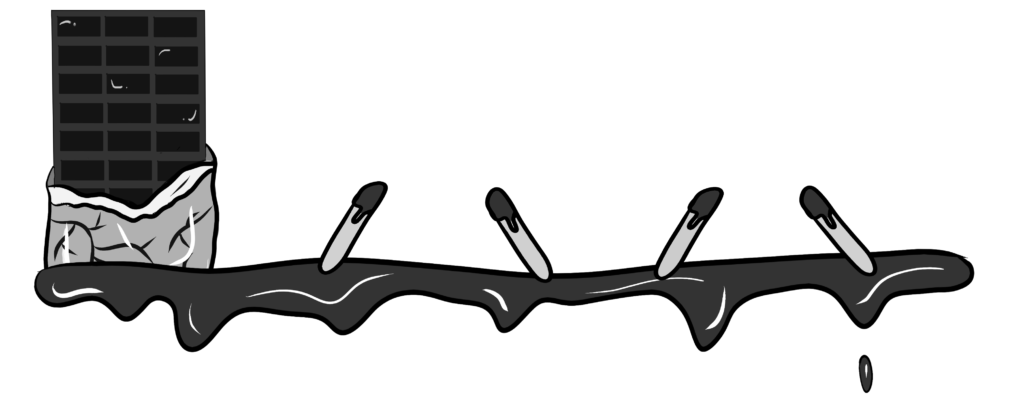
Myrtille & Chocolate Factory’s Interviews
Emmanuel.le Linée
Emmanuel.le Linée is a young theatre writer, but also an explorer of gender and language. Their work makes us dive into pieces of life that hit straight in the face, speaking frankly of poverty and sexuality, and allowing us to meditate on the absurdity as well as the (very) material things. Here’s a little walkthrough of their poetic and politic universe, between trash and sensibility.
| By Myrtille / Illustrations : Rouli / Translated by: Julie B.

To many people, theatre seems like a very codified, bourgeois, unaccessible environment, often so much that it keeps people from getting interested in it.
What brought you to it ?
Well, the answer is a mix between many things, and nothing special. Theatre has always been « my thing », ever since I was a child. I used to practice it in an MJC back in high-school, and then I started writing, like writing A LOT back in December 2014. It was for me, to prevent myself from drowning. I kept doing theatre on the side, while I got my finals and I studied at university. And then, fatally, I started writing theatre.
You mix art, love and politics. You make bridges between what is intimate and what is social.
So, considering that your art allows a representation of the queer (transpédégouine*) community, as in your last text Touz, réflexion métaphysique après la baise (Touz, metaphysical reflexion after fucking), do you consider that writing for the stage is a political act ?
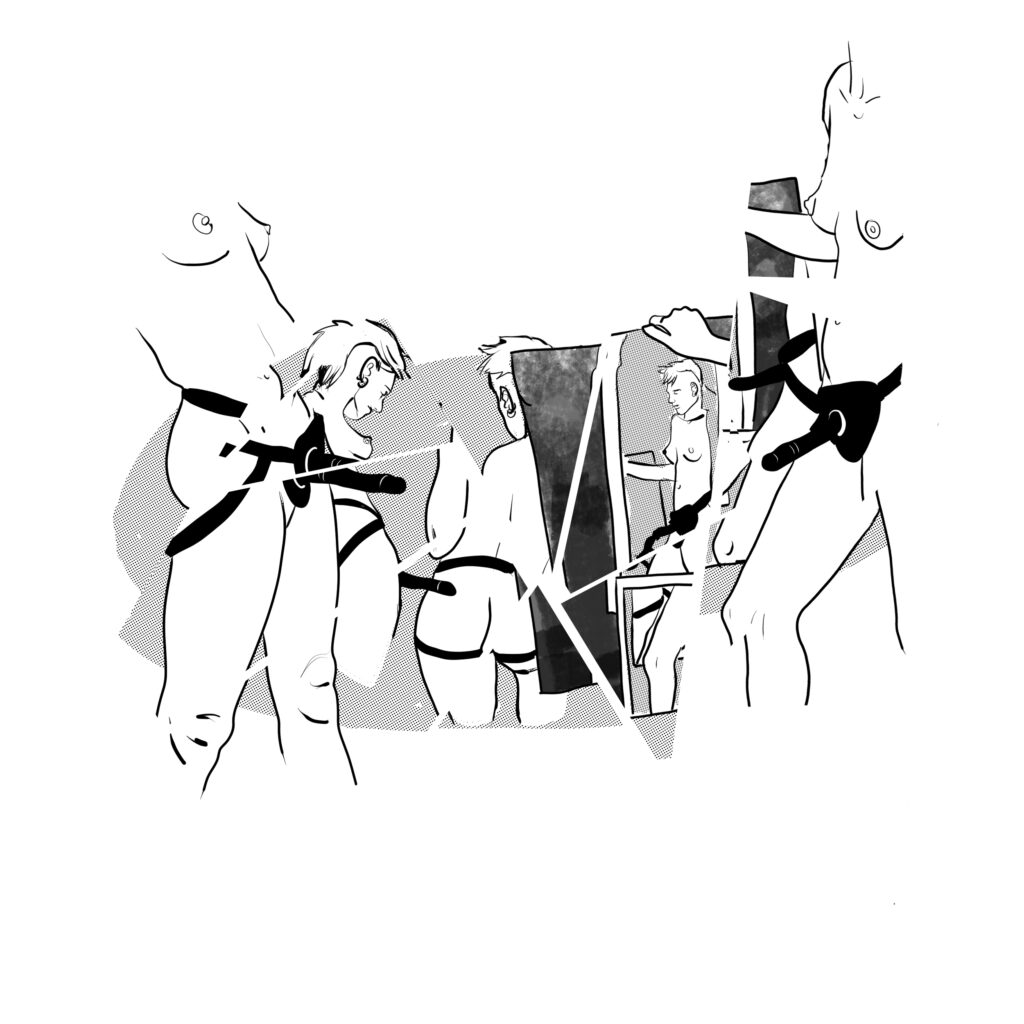
I’m not sure it’s militant. When you make something militant, you’re convinced, you’ve got profound convictions and certainties about what’s supposed to be done, what you do and why you do it. Writing for theatre is staging alterity, and therefore it reflects our own unthinked bias, our contradictions. It might actually be the contrary of militancy. I wrote a piece at the beginning, to have fun and piss off the straights.
But Touz is not a manifest. It’s a bunch of questions I wonder about, and that’s why I write. I don’t have better answers than the reader/spectator, my place of writing really is a place of wondering and fun, I have to say.
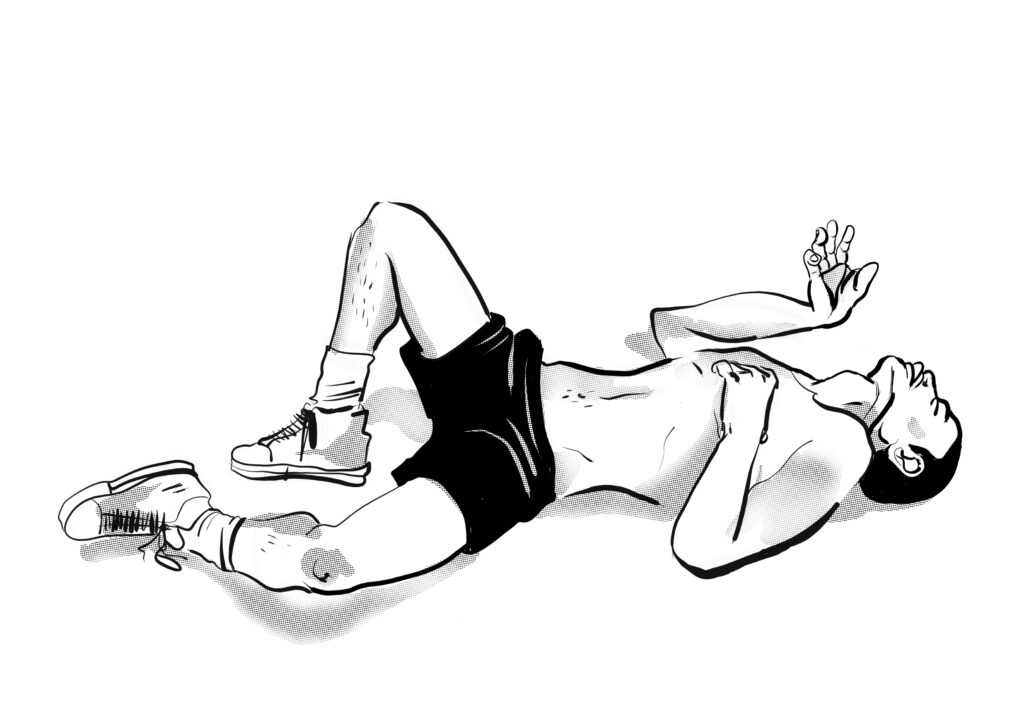
We’d like to see queer bodies and queer identities on stage, to reverse the constant invisibilization and under-representation in the acting milieu.
Do you have a project to put your text on the stage ? Could the performance form be a solution ? Also, how to chose the actors/actresses for theses particular roles ?
Ah, good question ! Well, no, not for the moment. I’ve already done two public readings : one in an institutional setting, and another one in a home made festival with a lot of queer folks (TPG*), and it was great. But no, putting this text on stage isn’t a project for now… But I wrote it in a way that makes it possible for somebody to put it on stage, but they’ll have to question the casting of the roles.
There are many dramaturgical indications in the text that leave not doubt about the characters’ queerness (but it is never explicitly written). But apart from that, I didn’t want my text to give a corporality to my characters ; for instance, I didn’t want people to project identities on my characters like : « ah yes, that on is the cis fag », or « ah yes, she’s the butch dyke », etc. So the characters don’t have official names, they change names at every prompt. They are genderless characters, without a defined identity or body, in perpetual movement. So there are no restrictions in terms of casting.
The actual concept of character is rather questionnable in my text. There’s isn’t any kind of character psychology, as they are defined by their interactions with the group.
When you play in theatres, there’s the question of the audience, of whom we speak to.
Would you find it interesting to play in different places (in the street, in squats…) to touch a different audience, one that doesn’t go to theatres, or would you rather stay in institutional theatres so that you can reclaim a place that you don’t have much access to ?
Well, yes ! I’d like it to be diffused everywhere. I think that my text, and more generally my writing, isn’t « addressed » to anyone in particular. But what I question in Touz is about intra-community problematics. I even had non-queer people telling me that it touched them, so you know, good if everybody can relate.
The address question is a delicate one. To think about the address before writing means to think about one’s place as a writer as well.
In the end, with the feedback I got, I realised that some people love it, some hate it, and it’s quite independent of their queerness, or their place in the theatre institution…
You can’t really predict the reception, so you can’t really predict the address.

In Touz, you play with words, you deconstruct the structure of sentences and of gender, you don’t care about theatrical conventions, and you invite us to a demanding and chaotic reading.
We get out of that text troubled, touched, moved, without clearly understanding what just happened. What kind of effect of the audience are you seeking ?
I don’t remember who told me that, but someone said that Touz is as if Sarah Kane had fucked with Copi. I like the image. My way of researching consists in trying to realise what I was researching in the last moment.
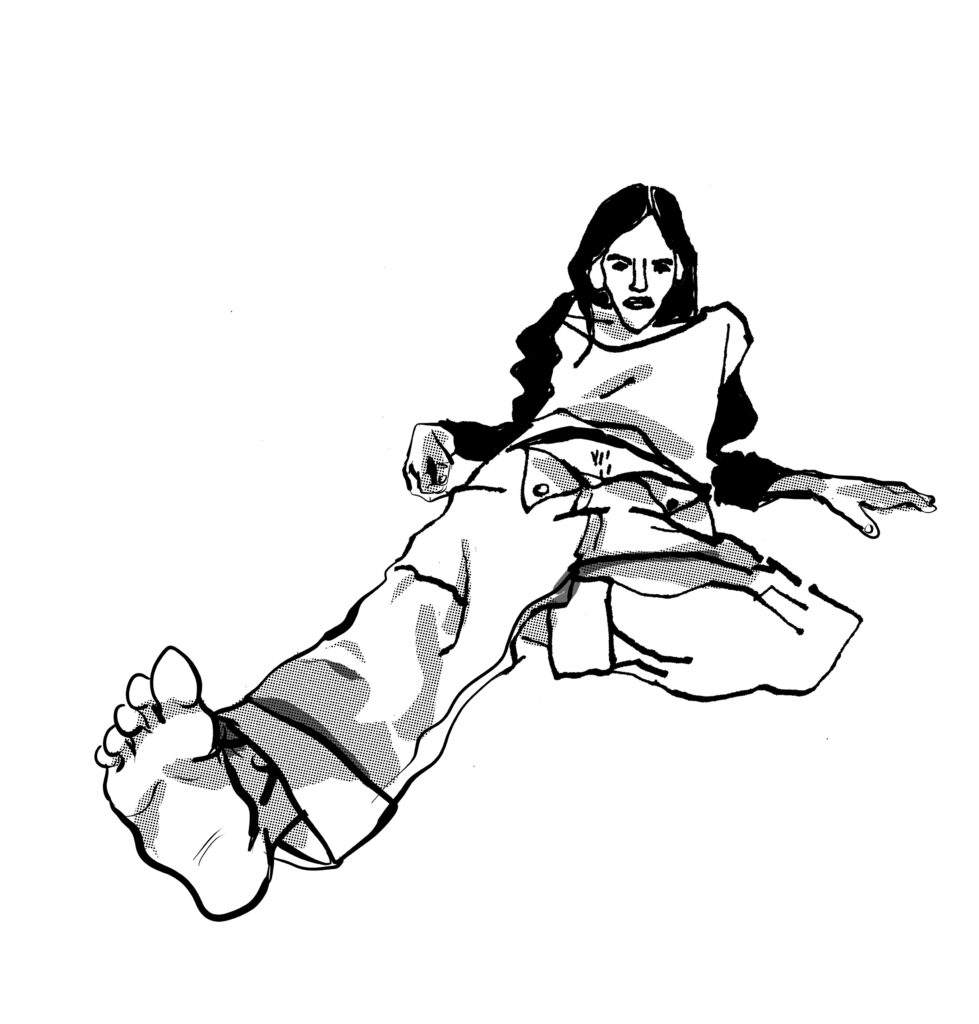
I think that reading Touz is more challenging than hearing it, because there are eleven characters, and the prompts fly, so I realise it can be challenging. It’s really something I wrote like a musical part, and that takes its materiality in reading it aloud. I didn’t really want to do something in particular, I just spurted on my open document for fun. Then I realized what it questionned. But I’m quite happy with your description of your reading experience, it’s cool that it provoked this kind of feeling.
It happens that some people just don’t get the thing. It’s sometimes hard to them to break away from the « crude » and « shocking » aspects of the text. It’s good if it polarizes the opinions, I considered it a success.

Your style of writing makes me think of poet Elodie Petit’s « Langue Bâtarde » (« Bastard Language »), which she defines in this extract of her manifest :
« It is not there to please men, or the good society, or the educated, the French literature, at the autumn publishing season. […] It doesn’t eat meat. It troubles the well-oiled hetero-patriach system, it pisses in your shoes, it says fuck you. It likes ass, nasty and direct.»
Does this definition speak to you ?
Yes Elodie, of course !!! I got acquainted with her writing in 2021, as well as the writing of Marguerin Le Louvier, in their Anthologie Douteuse. I love what they do, their writing saved me, kept me from drowning in a bourgeois language, and fine my people in the poets of this world.
A few days before writing Touz, I read Des cafards dansent autour des poubelles, by Elodie, in the Anthology. It is about a orgy. I think it really influenced me, and I realized it way later. You never really invent anything.

Do you have projects (writing, or something else) ?
Yes, yes. I don’t know how much I should talk about it. The project is like me : always mutating. But yes, right now I am concentrating on writing.
I also discover some new tools, like the inclusive-writing typefaces, updated for free by the Bye Bye Binarie collective. I’m still getting used to it, but it’s really fun, and it multiplies the possibilities. I highly recommend to everyone to download it !
A book or a show to recommend, in conclusion ?
Anthologie Douteuse, by Marguerin Lelouvier and Elodie Petit, of course.
Scum manifesto because you always need that kind of revolutionary humor… An in terms of theatre : Copi, all of his pieces are worth seeing or reading, but La Tour de la Défense is my favorite : there are stories of LSD, faggots fucking in the Tuileries or in bathrooms, transvestites, frozen babies and burnt snakes as Christmas Turkeys. It’s incredible, you really have to read this text.
– CUM FAST
Extracts from Touz, réflexion métaphysique après la baise
– AND GO BACK TO WORK YOU SCUM
– PRODUCE CUMING MATERIAL FOR OTHER PEOPLE
– BUY SOME SHIT THAT OTHERS HAVE PRODUCED TOO FAST FOR YOU
– AFTER THEY’VE CUM TOO FAST
– LIKE YOU
– LIKE US
– YOU HAVE TO CUM FAST
– AND GET BACK TO WORK FAST
– WORKING TIME IS
A brief silence
– UNCOMPRESSIBLE
BLACKOUT
* transpédégouine : A French attempt to translate the concept of « queer »— literally translatable as : trans-faggot-dyke. Frequently condensed as « TPG ». This term is often considered as more politically radical.
